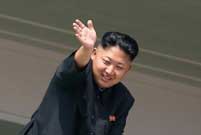 China's new-type guided missile frigate 'Bengbu' in live fire training
China's new-type guided missile frigate 'Bengbu' in live fire training
 China's weekly story (2013.8.24 - 8.30)
China's weekly story (2013.8.24 - 8.30)
 Flight team performs first show abroad
Flight team performs first show abroad
 The last days of Wan Aihua- a 'comfort woman' during the WWII
The last days of Wan Aihua- a 'comfort woman' during the WWII
 Top 10 private Chinese enterprises 2013
Top 10 private Chinese enterprises 2013
 'College campus queens' welcome the new students in Hunan
'College campus queens' welcome the new students in Hunan
The setting was phantasmagoric. Amid the meticulously manicured lawns and splendidly decorated foyers of what was once the majestic summer palace of the Tsar, handsome ushers in glittering imperial uniforms and gorgeous ladies in flamboyant courtly dresses welcomed the leaders of the 20 most powerful nations on earth to an evening of spectacular fireworks and colorful performance.
The nostalgic scene was vaguely reminiscent of the opening chapters of War and Peace.
And fittingly so. For later, during the sumptuous feast in the equally grand dining hall, grave matters concerning war and peace in Syria were heatedly discussed among the leaders of the exclusive G20 nations, lasting until well past midnight.
Russian President Vladimir Putin played the role of the fair and pragmatic host and prompted an opportunity at the summit dinner for all leaders to express their views on the Syrian issue.
It was officially acknowledged even by the US administration that the Syrian opposition forces, which would presumably fill the void after the collapse of the Bashar al-Assad regime, were heavily infiltrated and hijacked by religious extremists and terrorists from near and far.
With the dark shadows of the September 11 attacks still lingering, does the US really want to see the emergence of yet another theocratic regime in the colors of the Taliban?
It is no secret that Russia and China have always been firmly against the use of force against a sovereign nation for alleged internal misdeeds, without the authorization of the UN Security Council. This view was unsurprisingly echoed by UN Secretary-General Ban Ki-moon.
At the end of the day, and after much wrangling behind the scene, the US managed to get only 10 of the G20 nations to sign on to a lukewarm support to "reinforce the prohibition on the use of chemical weapons," hardly a clear-cut endorsement of the possible US strikes against the Syrian regime. A notable non-signatory was Germany, an otherwise close US ally.
Obama was perhaps aiming for a higher degree of support for strikes against Syria among G20 nations, so as to strengthen his hand in getting the US Congress to authorize such strikes. Alas, he went home with hands only half full.
Chinese President Xi Jinping, who made his debut at the G20 Leaders' Summit, tried his best to steer the discussions back to the main theme of worldwide economic rejuvenation.
In his speech, Xi emphasized the importance of countries getting each of their own economic houses in order, better coordinating their economic policies, and reducing barriers against free trade and strengthening international financial governance.
In a world still plagued by economic slowdowns, Xi's suggestions, if properly implemented by the G20 nations as leading examples for other nations to follow, could hopefully help alleviate the downward spirals.
When Xi and Obama met again at the sideline of the summit, they reiterated the two countries' common commitments to reduce greenhouse gas emissions.
At first glance, this may appear not too significant when compared against more pressing issues such as the limping global economy.
Let us not forget however that merely a few years ago, the two countries were not exactly on similar terms when it came to addressing environmental concerns.
Perhaps this was another continuing expression of the "new type of great power relations" which was espoused by both leaders in their California summit three months ago.
And aside from Syria, the worldwide focus for this round of G20 summit was the brief exchange between Xi and the Japanese Prime minister Shinzo Abe, again at the sideline of the summit.
Much has been attributed to the significance of this short meeting, but perhaps the most potent message it sent out to the world was that both China and Japan realized that their bilateral relationship is a complex and comprehensive one, and renewed close ties based on sincere, mature and pragmatic actions are in the best interests of everyone.
As the G20 leaders departed St. Petersburg, all eyes, which were supposed to focus on global economic revival, were unfortunately trained on the developing situation in Syria.
 DPRK holds military parade to mark 65th founding anniv.
DPRK holds military parade to mark 65th founding anniv. Highlights of MAKS 2013 Int'l Aviation and Space Show
Highlights of MAKS 2013 Int'l Aviation and Space Show  10th China-ASEAN Expo opens in Nanning
10th China-ASEAN Expo opens in Nanning Eagle Boy takes to sky to break another record
Eagle Boy takes to sky to break another record 12-year-old boy becomes pillar of the family
12-year-old boy becomes pillar of the family Eye-gouged boy receives blind rehabilitation in Shanxi
Eye-gouged boy receives blind rehabilitation in Shanxi Top 10 naked hotels in the world
Top 10 naked hotels in the world The most gorgeous Chinese women in the eyes of foreigners
The most gorgeous Chinese women in the eyes of foreigners A collection of bizarre rooftop buildings around China
A collection of bizarre rooftop buildings around China Residences of the royal house of Savoy
Residences of the royal house of Savoy China's frigate 'Bengbu'in fire training
China's frigate 'Bengbu'in fire training Fresh students 'forced' to register in university independently
Fresh students 'forced' to register in university independently 2013 Taiwan Int'l Tourism Expo kicks off in Taipei
2013 Taiwan Int'l Tourism Expo kicks off in Taipei Photo story: Take a gap year
Photo story: Take a gap year Nokia's Global Headquarters: visiting a declining empire
Nokia's Global Headquarters: visiting a declining empireDay|Week|Month